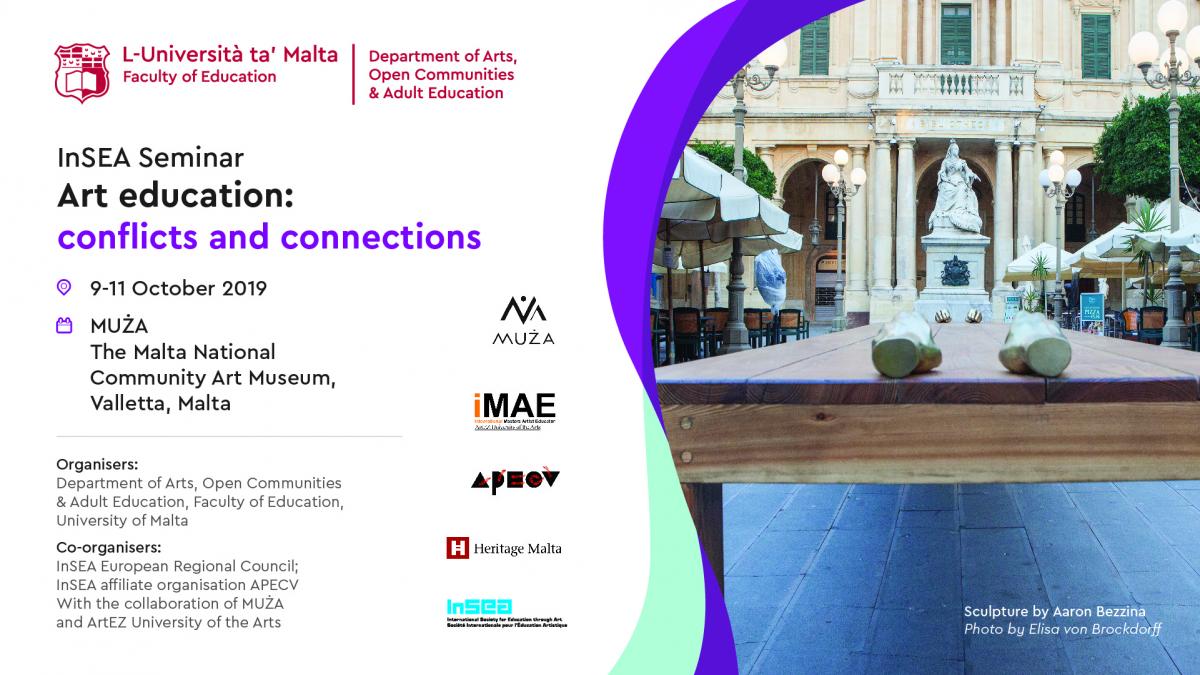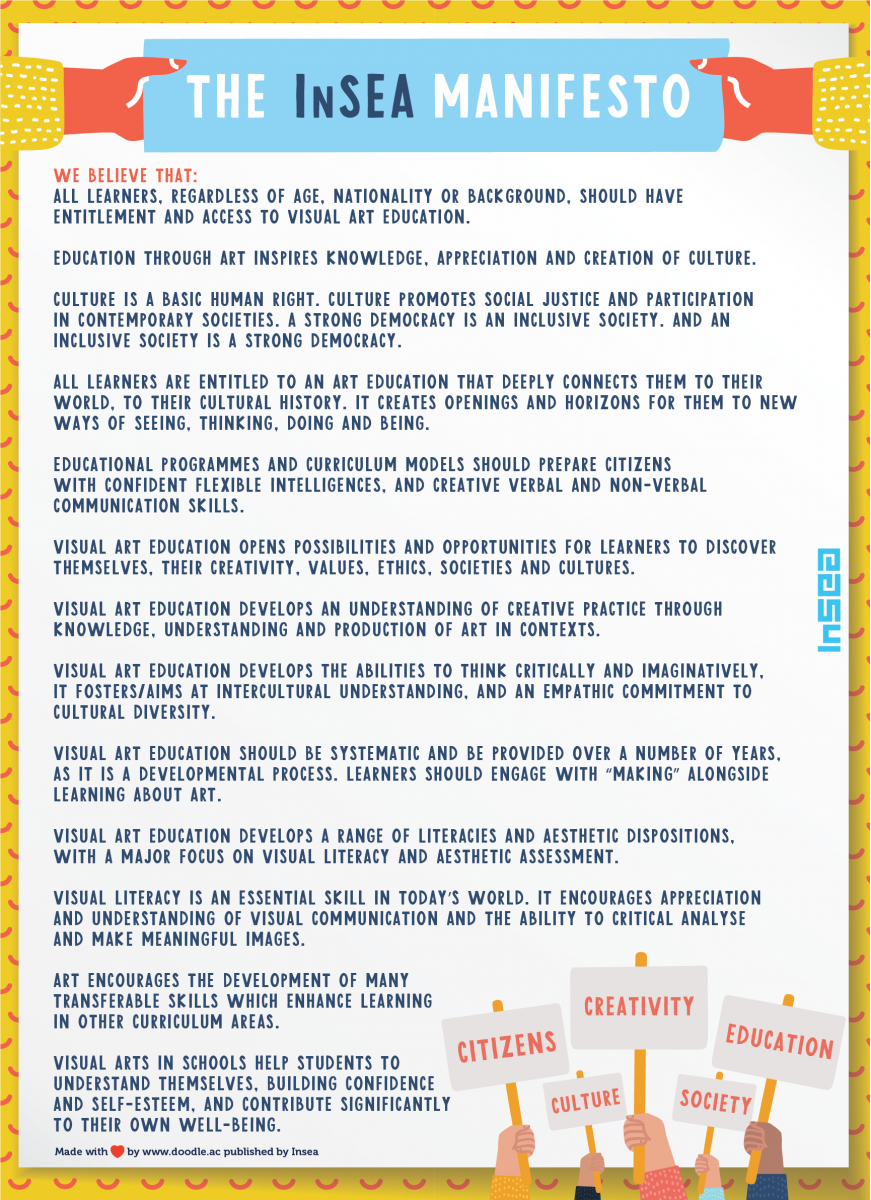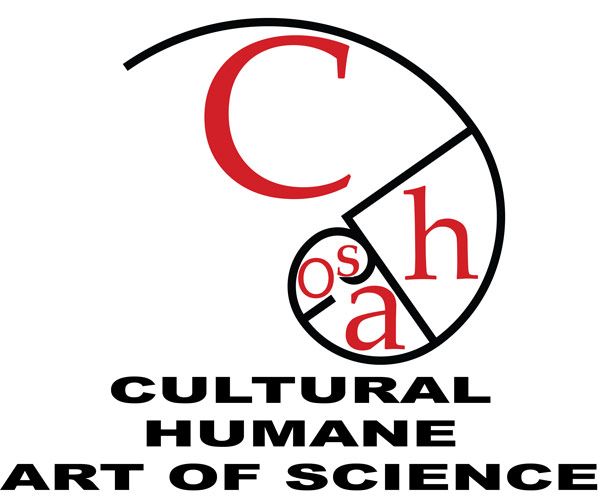we are honored that our Workshop is accepted at the InSEA 'Art Education - Conflicts and Connections' Seminar, Malta, October 2019
Workshop Design
It is built on top of the CoLaboArthon (Art + IT (Science) framework) and according to (Minkler, 2000) a toolset fitting Participatory Action Research (PAR) - by being: participatory, cooperative, co-learning process for researchers and community members; a method for systems development and local community capacity building; an empowering process through which participants can increase control over their lives by nurturing community strengths and problem-solving abilities; anda way to balance research and action.
Description
At this workshop+performance, we play with and on the concept of dialogue. It is mostly built as an extension of our tested format https://cha-os.org/en/sustainable-development/#performative-dialogue.
Participants will build their perspectives on knowledge and goals, that will divide their perspectives. We will enter this exploration through a structured COGNITIVE format of dialogue, over DialoGame (https://cha-os.org/en/dialogame/) toward AFFECTS-driven dialogue, performed through an artistic co-creation and collective creative writing (exploration of long creative leaps and a trip from individual toward collective ideas and shared vision). Participants will embody them and turn into collective vision and action.
We will practice collective awareness, collective creativity and IT-supported creation of performance artivism - toward a collaborative (community-based) piece of Socially Engaged Art (SEA).Examples of our SEA work:- https://cha-os.org/en/poetry-on-the-road/- https://cha-os.org/en/hand-and-voice/and several others listed among https://cha-os.org/en/activities/
Participants make the progress on the road of “ problem+challenge → understanding+knowledge → performance+reaching society ”)They also identify the SDGs (Sustainable Development Goals) as a starting point for mapping and clustering the social, environmental, and other issues/challenges.
Participants of the workshop will get acknowledged with the Colabo.Space and inspired to use it in their own art-based education and workshops as a free Open Space technology for social good. They will learn how their education practice can be scaled up toward bigger and online communities. They will get certified by ReMaking Tesla Forum.UNDP SDGs, tested through our serious game PlaySustainability. It is supported by PlaySound, by the partnering team from QMUL Uni, UK.
Methodology applied
Our approach to Coaching with Compassion and Intentional Change Theory (enabling participants to explore their inner-goals and to connect them with possible actions, especially those they can start collectively with the peers at the event), our DialoGame toolset, supported by IT-science (usе of Machine Learning, Artificial Intelligence, and NLP (for texts-dreams analyses and matching), Vygotsky's “a head taller” approach, Grotowski’s Poor Theatre approaches practiced by ReMaking Tesla co-founders Plavo Theatre.
We build upon research on the Relation between Creativity and problem-discovery process (Moor et al).
We will explore and evaluate how by being guided through positive behaviors “individuals of great diversity would live in pursuit of human unity” (inspired among others by Auroville Charter). The workshop will enable this by uniting modern scientific IT-ecosystem and holistic perspective of Art and Science. Participants will use Mobile Apps to co-create their views. The IT-system will guide their opposing, diverse views toward the unity of co-creation. We will examine the role of the performance in the contemporary world, which is both over-connected and under-connected.
We will develop Non-Violent Communication, tested at our https://pplg.org/ 2018 workshop and supported by role-playing.Based on our concept of performative dialogue, tested at Performing the World Conference (https://www.performingtheworld.org), New York. More at: https://cha-os.org/en/sustainable-development/#ptw, and Everyday Heroes ERASMUS+ workshop - more at: https://cha-os.org/en/sustainable-development/#everyday-heroes
It is developed on CoLaboArthon (http://cha-os.org/colaboarthon/) model supported by Colabo.Space (http://colabo.space/) IT-ecosystem that are used over 3 continents. CoLaboArthon is supported by the Serbian Ministry of Culture and is to be presented at http://elo2019.ucc.ie/.
References
- Chen, B., Vansteenkiste, M., Beyers, W., Boone, L., Deci, E. L., Van der Kaap-Deeder, J., ... & Ryan, R. M. (2015). Basic psychological need satisfaction, need frustration, and need strength across four cultures. Motivation and Emotion, 39(2), 216-236.
- Csikszentmihalyi, M. (1997). Flow and the psychology of discovery and invention. HarperPerennial, New York, 39.
- Engelbart, D., & Ruilifson, J. (1999). Bootstrapping our collective intelligence. ACM Computing Surveys (CSUR), 31(4es), 38.
- Judge, T. A., & Ilies, R. (2002). Relationship of personality to performance motivation: A meta-analytic review. Journal of applied psychology, 87(4), 797.
- McCrae, R. R., & Costa Jr, P. T. (1989). Reinterpreting the Myers‐Briggs type indicator from the perspective of the five‐factor model of personality. Journal of personality, 57(1), 17-40.
- MacDonald, C. (2012). Understanding participatory action research: A qualitative research methodology option. The Canadian Journal of Action Research, 13(2), 34-50.
- Minkler, M. (2000). Using participatory action research to build healthy communities. Public health reports, 115(2-3), 191.
- Moore, M. T. (1985). The relationship between the originality of essays and variables in the problem-discovery process: A study of creative and noncreative middle school students. Research in the Teaching of English, 84-95.
- Newman, F., & Holzman, L. (2013). Lev Vygotsky (classic edition): Revolutionary scientist. Psychology Press.
- Rose, G. (2016). Visual methodologies: An introduction to researching with visual materials. sage.
- Vygotsky, L. S. (1980). Mind in society: The development of higher psychological processes. Harvard university press.
- Ryan, R. M., & Deci, E. L. (2000). Self-determination theory and the facilitation of intrinsic motivation, social development, and well-being. American psychologist, 55(1), 68.
- Sawyer, R. K. (2009). Writing as a collaborative act. The psychology of creative writing, 166-179.
InSEA - Seminar Info

For decades, art education and artistic practices have interacted with ethical and political questions. The political is often conceived in conflictual terms: separatisms, ethnic, religious or sexual discriminations, immigration issues and border controls, conflicting interpretations of climate change. Politics is a contested space where different interests cross paths. Art and education cannot avoid interrogating these paths but in what ways is their approach to political struggles and ethical dilemmas characterised by a different agenda? How do they propose healthy critiques and forms of connective thinking, reminding us of the forgotten? In this InSEA Seminar we explore art education as an undertaking that draws our attention to cultural tensions and also helps to mould new agencies and meeting places, redefining itself as a social process that not only produces new artefacts but engages directly with living relations. Hosted by the Department of Arts, Open Communities and Adult Education at the Faculty of Education, University of Malta, this InSEA Seminar welcomes contributions from educators, arts practitioners and art education researchers
More at: http://insea.org/InSEA-Malta-seminar-2019

